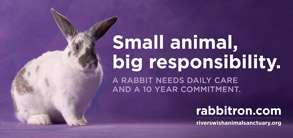Rabbits are very misunderstood animals.
There are many myths associated with rabbits that put them at risk of abuse and neglect. Here are just a few.
MYTH: RABBITS DO NOT NEED TO BE SPAYED OR NEUTERED
Spaying or neutering cats and dogs reduces the pet overpopulation crisis and provides protection against reproductive diseases and disorders. The same is true for rabbits!
KAR spays and neuters all rabbits, cats, and dogs in its care before they are available for adoption. We strongly believe that all rabbits should be spayed or neutered.
Benefits of spaying/neutering for rabbits:
- Helps reduce the pet overpopulation crisis by eliminating the potential for unwanted litters.
- Eliminates reproductive diseases, such as cancers of the uterus, mammaries and testicles. Studies show that nearly 80% of unaltered female rabbits will get uterine cancer by age 6!
- Reduces unwanted behaviour in males and females such as digging, chewing, spraying, circling and mounting and aggressive or territorial behavior
- Improves litter habits. Most spayed or neutered rabbits have good habits allowing them to live free-range or partially free-range
- Improves ability to bond with other rabbits – if rabbits are left unaltered (even if same-sex) it can be difficult or even impossible to achieve a successful bond between two rabbits.
- Eliminates the possibility of “false pregnancies,” a condition experienced by unaltered females that causes them to feel and behave as though they are pregnant when they are not, leading to stress and health issues.
- Before booking your rabbit's surgery, search for a rabbit-savvy veterinarian in your area. Rabbits are different from cats and dogs and require a veterinarian knowledgeable about their special needs.
MYTH: RABBITS MAKE GREAT EASTER PRESENTS
Animals are never appropriate gifts.

They are living beings that deserve to be adopted into loving, willing and committed homes. Adopting an animal is a commitment for the animal’s lifetime – for rabbits that can be 10+ years.
Many people purchase rabbits – often baby bunnies – for their children at Easter. Within a few months, the child is bored with the bunny and the parents realize a rabbit can be a lot of work. By June Easter bunnies fill animal shelters looking for new homes and facing the risk of euthanasia.
KAR strongly discourages purchasing rabbits for Easter. Buy a chocolate or plush bunny instead!
Please visit Make Mine Chocolate to learn more about the tragedy of Easter rabbits.
MYTH: RABBITS CAN BE KEPT OUTDOORS
Since they are part of your family, rabbits should be housed indoors. It is not appropriate or safe to house a rabbit outdoors.

Reasons why rabbits should be housed indoors:
- Rabbits are social beings that love the company of other animals and humans. Your rabbit will be happier and friendlier living inside the home with your family.
- Our four-season Canadian climate is not appropriate for housing rabbits outdoors. It’s too hot in the summer, too cold in the winter, and too wet the rest of the time!
- Parasites like mites, fleas and other bugs can cause major health issues for rabbits including fly strike, which can be deadly.
- If your rabbit is housed outdoors, away from you, it is impossible for you to properly observe your rabbit’s health.
- An outdoor hutch, pen or other enclosure can never provide full protection from predators. Housing your rabbit outdoors means you are risking death.
Some rabbit owners enjoy bringing their rabbits outside for supervised outings. If you wish to do this, please ensure you:
- Place your rabbit in a secure pen or fenced in yard – check for holes/gaps around the fence. Rabbits can dig very quickly. A dog exercise pen or pen made of NIC cubes works very well.
- If using a harness and leash, ensure the harness fits your rabbit correctly and that you only take the rabbit to a safe area away from dogs and other predators. Public parks can be very dangerous!
- Supervise your rabbit at all times.
- Ensure your rabbit has access to shade and fresh water.
- When you bring your rabbit in, check him/her over for any nicks, cuts, or insect bites etc. Rabbits can easily pick something up when outdoors.
MYTH: RABBITS ARE GREAT PETS FOR CHILDREN
Because rabbits are cute, small animals, many people have the misconception that they make great pets for children. Unfortunately, this is not true.
Why rabbits are not usually the right pet for a child:
- Rabbits have unique and fragile skeletal structures and can easily suffer unintentional fractures or breaks when handled by a child.
- Generally, rabbits do not like being picked up and carried.
- As prey animals, rabbits often mask signs of illness and must be monitored closely for health concerns. Children simply are not capable of identifying these signs.
- Children can be loud and energetic, which can frighten a rabbit.
With supervision and clear direction, children can be taught how to respect, handle and respond to a rabbit. Learning how to treat a rabbit properly, will ensure your child and rabbit have a happy and healthy relationship.
- Teach your child that rabbits are not toys.
- Show your child how to pet a rabbit gently with the rabbit sitting on the floor and with soft, calm strokes on the head.
- Teach gentle handling such as setting the rabbit on your child’s lap rather than allowing the rabbit to be carried.
- Teach your child and rabbit games they can play together like fetch or tag. Many rabbits enjoy games and it’s a safe and fun way for your child to spend time with your rabbit.
- Establish visiting and handling rules for your child, like only visiting the rabbit with mom or dad.
- Never leave a young child unattended with a rabbit.
MYTH: AN UNWANTED RABBIT CAN BE RELEASED INTO 'THE WILD'
Domesticated rabbits cannot be released into the wild. This is NEVER an appropriate way to deal with a rabbit you no longer want. A pet rabbit is incapable of surviving in the wild.

If you no longer want your rabbit please contact your local humane society, a rabbit-specific rescue or Kingston Animal Rescue.
Reasons to not release a pet rabbit:
- Your rabbit will be exposed to predators including foxes, coyotes, wolves, fishers and birds of prey, plus dogs and cats.
- Your rabbit is used to his/her food and water being provided. He/she will struggle to find sustenance.
- Your rabbit will be exposed to parasites and will likely end up with fleas and/or mites or something worse. This will cause discomfort, stress and potentially death.
- Our four-season Canadian climate is not appropriate for domesticated rabbits. It’s too hot in the summer, too cold in the winter, and too wet the rest of the time! Your rabbit does not have the same instincts as a wild rabbits and will struggle to survive.
